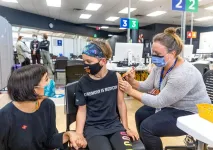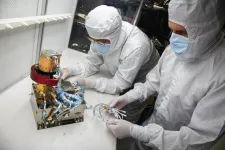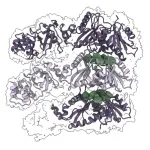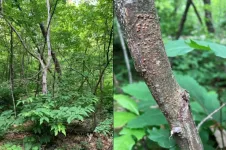The SWOG S1011 randomized phase 3 trial found no significant improvement in disease-free or overall survival but a higher rate of grade 3-4 adverse events and an increased risk of death in the 90 days after surgery. The findings, published in NEJM, should establish a standard bilateral pelvic lymphadenectomy that includes the external and internal iliac and obturator nodes as the standard of care for these patients.
Final results from the SWOG S1011 randomized phase 3 clinical trial, just published in the New England Journal of Medicine, indicate patients undergoing surgery for localized muscle-invasive bladder cancer derive no significant survival benefit from having an extended lymph node removal (extended lymphadenectomy) rather than the standard lymphadenectomy. The extended lymphadenectomy also increased the risk of complications and death in the three months following surgery.
“Bilateral pelvic lymphadenectomy is an essential component of radical cystectomy as it provides local control, accurately identifies pathologic nodal metastases, and is associated with long-term disease-free survival for some patients with proven nodal metastases,” said Seth P. Lerner, MD, principal investigator on the S1011 trial and the Beth and Dave Swalm Chair in Urologic Oncology at Baylor College of Medicine.
“Prior to S1011, however, most academic centers had adopted a more extensive lymphadenectomy based on seminal work by Don Skinner and others. Together with the German LEA trial led by Juergen Gschwend, S1011 addresses a highly relevant surgical question testing whether there is an oncologic benefit to extended lymphadenectomy.”
Lerner is also chair of genitourinary cancer research with the SWOG Cancer Research Network, a clinical trials group funded by the National Cancer Institute (NCI), part of the National Institutes of Health (NIH).
S1011 randomized 618 eligible patients who had predominant urothelial cancer, clinical stage T2–4a, N0–2. All patients had chosen to have a radical cystectomy (surgery to remove the bladder and other cancerous tissue). During the procedure, once the surgical team determined there was no evidence cancer had spread to lymph nodes beyond the standard lymphadenectomy area (the pelvic cavity), patients were randomized 1:1 to receive either a standard lymphadenectomy or an extended lymphadenectomy with additional nodes removed up to the aortic bifurcation.
The median number of lymph nodes removed from patients on the standard arm was 24 versus 39 nodes on the extended arm. The presence and extent of metastases to lymph nodes were similar across the two arms.
With median follow up of 6.1 years, there were no statistically significant differences in disease-free survival or overall survival between patients on the two arms. Five-year estimated disease-free survival was 60 percent on the standard arm and 56 percent on the extended arm (HR=1.10, 95% CI: 0.86, 1.40). Five-year survival was 63 percent on the standard arm and 59 percent on the extended arm (HR=1.13, 95% CI: 0.88, 1.45).
After surgery, roughly 44 percent of patients on the standard arm went on to experience grade 3-5 adverse events (serious side effects) versus 54 percent on the extended arm. Additionally, in the 90 days following their surgery, 2.3 percent of patients on the standard arm died versus 6.5 percent of patients on the extended arm.
To ensure consistent surgical practice throughout the study, each participating surgeon underwent a rigorous credentialing process before registering their first patient, submitting operative and pathology reports and photos taken during radical cystectomies they had recently performed. During the trial, surgeons also submitted intraoperative photos for each patient, and these were reviewed centrally to ensure surgical procedures complied with the trial protocol.
The authors state that the results of S1011 – as with results of similar randomized clinical trials in other disease sites such as gastric and pancreatic cancer – support the argument that prospective clinical trials of this sort should be conducted before more aggressive surgical procedures for treating cancer are widely adopted.
They expect that the S1011 results will establish that a bilateral standard, rather than extended, lymphadenectomy is the standard of care for these patients.
Study S1011 is supported by the NCI, part of the NIH, led by SWOG, and conducted by the NIH-funded NCI National Clinical Trials Network. S1011 was funded by the NIH/NCI through grants U10CA180888, U10CA180819, U10CA180820, U10CA180821, and U10CA180863 and Canadian Cancer Society grant 707213.
In addition to Lerner, co-authors on the S1011 publication included Catherine Tangen, DrPH, SWOG Statistics & Data Management Center and Fred Hutchinson Cancer Center; Robert S. Svatek, MD, University of Texas Health San Antonio; Siamak Daneshmand, MD, University of Southern California Norris Comprehensive Cancer Center; Kamal S. Pohar, MD, Ohio State University; Eila Skinner, MD, Stanford University; Anne Schuckman, MD, Oregon Health & Science University; Arthur I. Sagalowsky, MD, UT Southwestern Medical Center; Norm D. Smith, MD, University of Chicago; Ashish M. Kamat, MD, UT MD Anderson Cancer Center; Wassim Kassouf, MD, McGill University Health Center; Melissa Plets, MS, SWOG Statistics & Data Management Center and Fred Hutchinson Cancer Center; Rick Bangs, Bladder Cancer Advocacy Network and SWOG Patient Advocates; Theresa M. Koppie, MD, Oregon Health & Science University; Ajai Alva, MD, University of Michigan; Francisco G. LaRosa, MD, University of Colorado; Sumanta K. Pal, MD, City of Hope Medical Center; Adam S. Kibel, MD, Dana Farber Cancer Institute; Daniel J. Canter, MD, Fox Chase Cancer Center (during trial) and Oschsner Medical Center (current); and Ian M. Thompson, MD, CHRISTUS Santa Rosa Medical Center Hospital.
SWOG Cancer Research Network is part of the National Cancer Institute's National Clinical Trials Network and the NCI Community Oncology Research Program and is part of the oldest and largest publicly funded cancer research network in the nation. SWOG has 20,000 members in 45 states and eight other countries who design and conduct clinical trials to improve the lives of people with cancer. SWOG trials have directly led to the approval of 14 cancer drugs, changed more than 100 standards of cancer care, and saved more than 3 million years of human life. Learn more at swog.org, and follow us on Twitter (X) at @SWOG.
END









